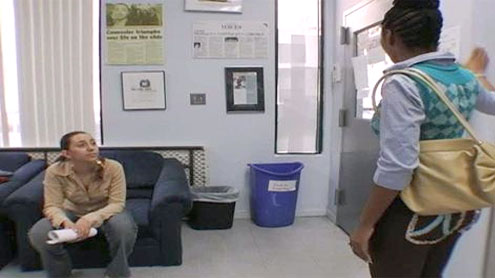 Rachel Lloyd understands why and how young girls become prostitutes. She was once once herself.”I grew up with a lot of trauma and dysfunction in my family,” she says. “So by the time I was like 13, I dropped out of school. I was working full time in factories and restaurants. I began to model, a kind of nude modeling, so I was already on the periphery of the sex industry.”Looking for a new start, Lloyd left her home in Britain for Germany. She ended up working as a hostess in a Munich sex club at the age of 17. After three suicide attempts and one effort by her boyfriend/pimp to kill her, she found shelter in a local American church. She eventually immigrated to the United States and vowed to not only change her life, but also to help young women in need.Lloyd recounts her story in “Girls Like Us: Fighting for a World Where Girls Are Not for Sale; An Activist Finds Her Calling and Heals Herself.” Lloyd began that healing process by going back to school when she was 23.In 1998, Lloyd decided to take action against the problem that had almost destroyed her life.
Rachel Lloyd understands why and how young girls become prostitutes. She was once once herself.”I grew up with a lot of trauma and dysfunction in my family,” she says. “So by the time I was like 13, I dropped out of school. I was working full time in factories and restaurants. I began to model, a kind of nude modeling, so I was already on the periphery of the sex industry.”Looking for a new start, Lloyd left her home in Britain for Germany. She ended up working as a hostess in a Munich sex club at the age of 17. After three suicide attempts and one effort by her boyfriend/pimp to kill her, she found shelter in a local American church. She eventually immigrated to the United States and vowed to not only change her life, but also to help young women in need.Lloyd recounts her story in “Girls Like Us: Fighting for a World Where Girls Are Not for Sale; An Activist Finds Her Calling and Heals Herself.” Lloyd began that healing process by going back to school when she was 23.In 1998, Lloyd decided to take action against the problem that had almost destroyed her life.
She founded Girls Educational & Mentoring Services (GEMS) in New York City. The nonprofit has grown from her small apartment to two offices and 25 full-time staff. A 2008 documentary called “Very Young Girls,” highlights her work.”The core of our work is the direct services to young girls and women,” Lloyd says. “That looks like street outreach, outreach into detention centers, group homes, anywhere we know that there are young people at risk.”GEMS offers these young people not only a safe refuge and hot meals, but also job training, education and unconditional support. Raising public awareness about the plight of teen prostitutes and changing social attitudes, Lloyd says, are critical to ending the problem.”If you feel like your family, your community, your place of employment is always going to look at you as a prostitute and you’re scorned and ashamed for that, then you might as well stay because what’s the point of trying to move forward, if people are always going to look down at you?”GEMS representatives – young women who’ve made the transition from the street to a new life – go to conferences, detention centers, local high schools and churches to talk about their experiences.”They are the best advocates, the best peer mentors for girls who may be nervous about speaking up or ashamed or feel like they can never tell anyone,” says Lloyd.
GEMS also advocates for legislative change. In 2008, the organization played a key role in successfully lobbying New York legislators.”We actually passed the first law in the country – The Safe Harbor for Exploited Youth Act – which means that young people under the age of 16 can’t be charged with an act of prostitution,” Lloyd says. “It becomes a child protective issue as opposed to a juvenile detention issue.”Lloyd would like to see every state in the country pass similar legislation.In recognition of her efforts, Lloyd has received numerous honors, including the Reebok Human Rights Award.”This award is actually recognizing probably for the very first time publically that the commercial sexual exploitation is a human rights issue,” she said.For Lloyd, what’s more rewarding than any recognition she receives are the success stories of those young girls, when they leave the streets, get an education, find a job and start a new life. – Voanews












